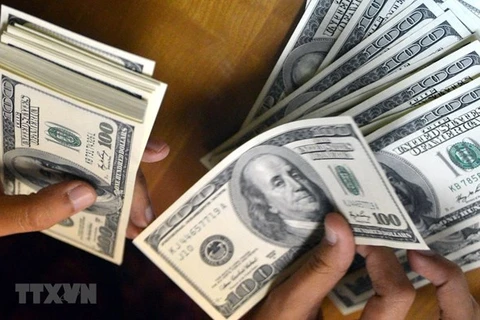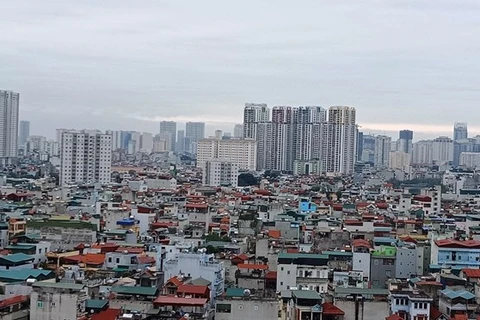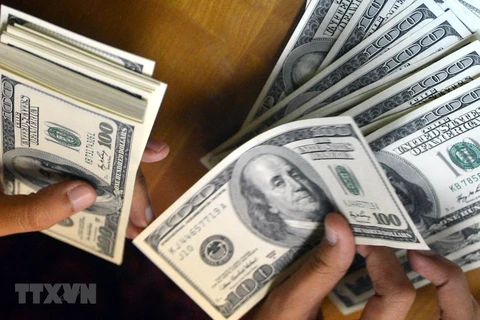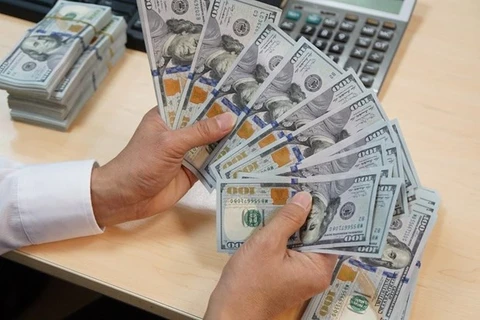 Remittances sent to Vietnam rise continuously. Remittance flows into Vietnam reached 16.7 billion USD in 2019, equivalent to 6.4 percent of GDP. (Photo: VietnamPlus)
Remittances sent to Vietnam rise continuously. Remittance flows into Vietnam reached 16.7 billion USD in 2019, equivalent to 6.4 percent of GDP. (Photo: VietnamPlus)
Hanoi (VNA) – Remittances poured into Vietnam have increased continuously through years, contributing to raising foreign currency supply and stabilising the exchange rate.
Remittance flows into Vietnam reached 16.7 billion USD in 2019, equivalent to 6.4 percent of GDP. With the amount, Vietnam ranked ninth among the world’s top ten remittance receivers in the year.
Experts said that the amount was a big supply of foreign currencies playing an important role in reducing risks in capital mobilisation, decreasing dependence in foreign capital sources, and in helping the exchange rate in Vietnam stabilise in face of “big waves” from the US-China trade war.
Diversifying remittance flows
In the past, overseas Vietnamese (OVs) mainly sent money back to Vietnam as allowances for their relatives. At present, remittance flows are more diverse, also from guest workers and business and production investments.
Over the past years, Vietnam has encouraged OVs to invest in the country, while allowing the sending and receiving of remittances in foreign currencies. The remittance transfer through official channels has grown rapidly with the participation of many banks and businesses with high competitiveness.
[Prime Minister hails OVs’ warm sentiment for homeland]
Statistics show that there are currently around 4.5 million overseas Vietnamese living and working in more than 100 nations and territories over the world.
Banks have offered a lot of programmes to attract the idle cash rapidly and effectively, especially during the New Year holiday.
A leading official of a bank in Ho Chi Minh City said that in the last three months of 2019, remittances sent through this bank system rose by 30 percent compared to the previous quarter. The amount for the whole year saw a year-on-year increase of nearly 40 percent.
Remittances mainly come from the US, the UK and Canada. Vietnamese workers in Japan, Taiwan (China) and the Republic of Korea also add to the flow.
Meanwhile, total remittances via the Joint Stock Commercial Bank for Foreign Trade of Vietnam (Vietcombank) surpassed 2.5 billion USD in 2019, higher than the 2.2 billion USD in 2019 and 1.9 billion USD in 2017.
Remittance flows into Vietnam experienced a 120-fold increase in 26 years, from 140 million USD in 1993 to 16.7 billion USD last year, with the largest part coming to the southern economic hub of Ho Chi Minh City (5.6 billion USD).
Nguyen Hoang Minh, Deputy Director of the State Bank of Vietnam – HCM City branch, said that 70 percent of the city’s remittances was invested in business and production activities.
Resources for economic growth
Experts attributed the surge in remittance flows to more transparent transfer mechanisms.
Economist Nguyen Tri Hieu said that remittances have contributed remarkably to Vietnam’s foreign currency reserves.
He said that an increase in the flows in recent years reflects that OVs have more trust in the Vietnamese economy’s stability and see better investment opportunities in the domestic market.
The biggest advantage of remittances is that they do not have latent risks like foreign direct investment (FDI) or official development assistance (ODA), Hieu added.
To lure more remittances, Hieu suggested the Government issue more policies to support the attraction such as investment and trade policies dedicated to OVs, intensify communications to make OVs know about investment opportunities in the homeland.
The State Bank of Vietnam should remain flexible in managing to stabilise the exchange rate so as to contribute to stabilising the macro-economy, the economist stated, stressing the necessity for more favourable policies to consolidate trust of OVs and remittance beneficiaries.
It is also important for Vietnam to maintain macro-economic stability, curb inflation, and improve the investment climate by avoiding sudden changes in investment-related regulations and simplifying administrative procedures, he added./.























